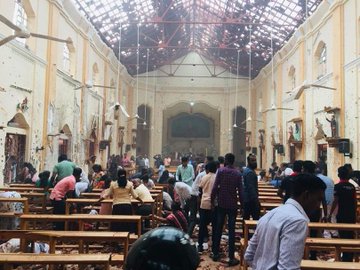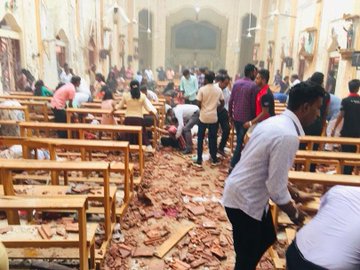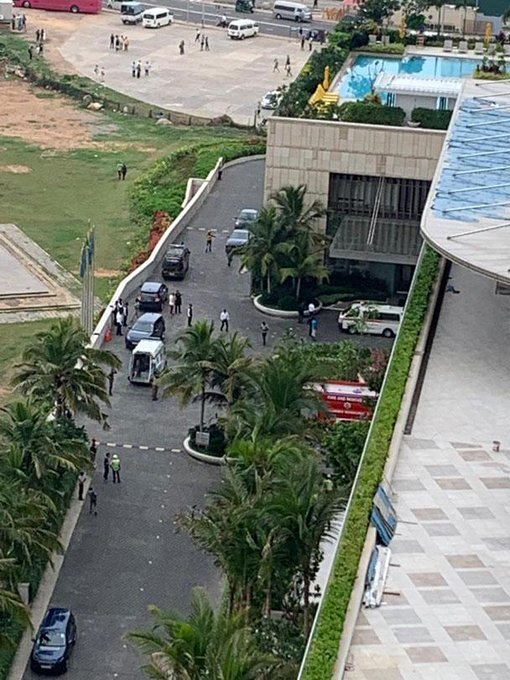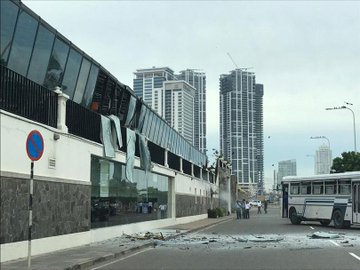At least 290 people were killed and nearly 500 injured as a series of near-simultaneous explosions ripped through three churches and three high-end hotels in three Sri Lankan cities on Easter Sunday. A seventh blast near another hotel in Colombo, hours after the first series of attacks, claimed two more lives.
The blasts hit four hotels and one church in Colombo, while two other churches were targeted in Negombo and Batticaloa, police said. The death toll included worshippers and hotel guests, and is expected to rise.
 The nature of the blasts was not immediately clear, but an official speaking on condition of anonymity said police suspects the blasts at the churches in Colombo and Batticaloa were carried out by suicide bombers.
The nature of the blasts was not immediately clear, but an official speaking on condition of anonymity said police suspects the blasts at the churches in Colombo and Batticaloa were carried out by suicide bombers.
The blasts hit three hotels and one church in Colombo, while two other churches were targeted in Negombo and Batticaloa, police said. There have been no immediate claims of responsibility.
At a glance:
- Four hotels ─ Cinnamon Grand, Shangri-La, Kingsbury and Tropical Inn ─ targeted in Colombo
- One church each targeted in Colombo (St Anthony's Shrine), Negombo (St Sebastian's Church) and Batticaloa (Zeon Church)
- 290 killed
- 36 foreigners among dead
- About 500 injured
- Curfew, 'temporary' social media ban imposed
- Attacks carried out by 7 suicide bombers
The first explosions were reported at St Anthony's Church in Colombo and St Sebastian's Church in the town of Negombo just outside the capital.
Shortly after those blasts were reported, police confirmed three hotels in the capital had also been hit, along with a church in the town of Batticalao, in the east of the country.

Local TV showed damage at the Cinnamon Grand, Shangri-La and Kingsbury hotels in the capital. The Shangri-La's second-floor restaurant was gutted in the blast, with the ceiling and windows blown out. Loose wires hung and tables were overturned in the blackened space.
A police magistrate was at the hotel to inspect the bodies recovered from the restaurant. From outside the police cordon, several bodies could be seen covered in white sheets.
Photos circulating on social media showed the roof of one church had been almost blown off in the blast. The floor was littered with a mixture of roof tiles, splintered wood and blood. Several people could be seen covered in blood, with some trying to help those with more serious injuries. The images could not immediately be verified.
Police chief warned of threat 10 days ago
According to a document accessed by AFP, the Sri Lankan police chief had warned of possible suicide attacks targeting "prominent churches" in a nationwide alert 10 days ago.
Police chief Pujuth Jayasundara sent an intelligence warning to top officers on April 11 setting out the threat.
"A foreign intelligence agency has reported that the National Thowheed Jama'ath (NTJ) is planning to carry out suicide attacks targeting prominent churches as well as the Indian High Commission in Colombo," said the alert. The NTJ came to notice last year when it was linked to the vandalisation of Buddhist statues.
SL PM condemns attacks
Sri Lankan Prime Minister Ranil Wickremesinghe condemned the attacks and called an emergency security council meeting, sources told Reuters.

"I strongly condemn the cowardly attacks on our people today. I call upon all Sri Lankans during this tragic time to remain united and strong," Wickremesinghe said in a Tweet. "Please avoid propagating unverified reports and speculation. The government is taking immediate steps to contain this situation."
President Maithripala Sirisena, in an address following the attacks, said he was shocked by the explosions and appealed for calm.
Finance Minister Mangala Samaraweera, writing on his verified Twitter account, said the attacks had killed "many innocent people" and appeared to be a "well-coordinated attempt to create murder, mayhem and anarchy."
The Pakistani Foreign Office retweeted contact information for the Pakistani High Commission in Colombo for Pakistani nationals in Sri Lanka.
Mano Ganeshan, the minister for national integration, said his ministry's security officers had been warned by their division about the possibility that two suicide bombers would target politicians.
The police's Criminal Investigation Department, which is handling the investigation into the blasts, will look into those reports, Gunasekara said.
Religiously motivated violence in SL
The scale of the bloodshed recalled the worst days of Sri Lanka's 26-year civil war, in which the Tamil Tigers, a rebel group from the ethnic Tamil minority, sought independence from the Buddhist-majority country. The Tamils are Hindu, Muslim and Christian.
According to a Dawn report, a common factor linking the church attacks was that they predominantly targeted Tamil Christians.
The St Anthony’s Catholic church in Kochchikde, located in a conclave near the Colombo port, was among the first to be bombed, when a mass in the Tamil language was going on.
The St Sebastian church in Negombo came under attack soon afterwards. Negombo is a popular tourist destination about 35km from Colombo.
Also coming under attack was the Christian Zion church in Eastern Batticaloa, a district which is populated primarily by Tamils and Muslims.
Only a small fraction of mainly Buddhist Sri Lanka is Catholic, but the religion is seen as a unifying force because it includes people from both the Tamil and majority Sinhalese ethnic groups.
Last year, there were 86 verified incidents of discrimination, threats and violence against Christians, according to the National Christian Evangelical Alliance of Sri Lanka (NCEASL), which represents more than 200 churches and other Christian organisations.
This year, the NCEASL recorded 26 such incidents, including one in which Buddhist monks allegedly attempted to disrupt a Sunday worship service, with the last one reported on March 25.
Out of Sri Lanka's total population of around 22 million, 70pc are Buddhist, 12.6pc Hindu, 9.7pc Muslim, and 7.6pc Christian, according to the country's 2012 census.
In its 2018 report on Sri Lanka's human rights, the US State Department noted that some Christian groups and churches reported they had been pressured to end worship activities after authorities classified them as "unauthorised gatherings".
Social media ban
The defence ministry said a temporary social media shutdown imposed yesterday would extend until the government concludes its investigation into the bomb blasts that rocked churches, luxury hotels and other sites.
However, NetBlocks observatory cautioned that such post-attack blackouts are often ineffective.
"What we've seen is that when social media is shut down, it creates a vacuum of information that's readily exploited by other parties," said Alp Toker, executive director of the London-based group. "It can add to the sense of fear and can cause panic."
The group said its monitoring of Sri Lankan internet connectivity found no disruptions to the fundamental infrastructure of the internet, meaning the blackout was directed at specific services. Some social media outlets, such as Twitter, appeared unaffected, but the blockage affected popular messaging services.
"That's going to be a problem for people trying to communicate with friends and family," Toker said.
Some internet users are circumventing the social media blocks by using a virtual private network, which masks the location of a computer, Toker said.
It isn't the first time Sri Lanka has blocked social media. The government imposed a weeklong ban in March 2018 because of concerns that WhatsApp and other platforms were being used to fan anti-Muslim violence in the country's central region.
An analysis by Sri Lankan researcher and author Yudhanjaya Wijeratne of thousands of Facebook posts made during last year's ban found that many Sri Lankans simply found ways around it.
Wijeratne has recommended narrower and more "technically challenging" approaches to curbing hate speech, such as better detection and strengthening local laws.
Facebook, which owns WhatsApp and Instagram, has struggled in recent years to combat the use of its platforms to incite violence and spread hate messages and political propaganda in countries including India, Myanmar and the United States.
The company said in a statement on Sunday that it has been working to support first responders and law enforcement in Sri Lanka and identify and remove content that violates company standards.
"We are aware of the government's statement regarding the temporary blocking of social media platforms," the company said. "People rely on our services to communicate with their loved ones and we are committed to maintaining our services and helping the community and the country during this tragic time."
Google didn't respond to a request for comment about the disruption to its YouTube service in Sri Lanka. Requests for comment made to messaging services Snap and Viber were not returned on Sunday.





